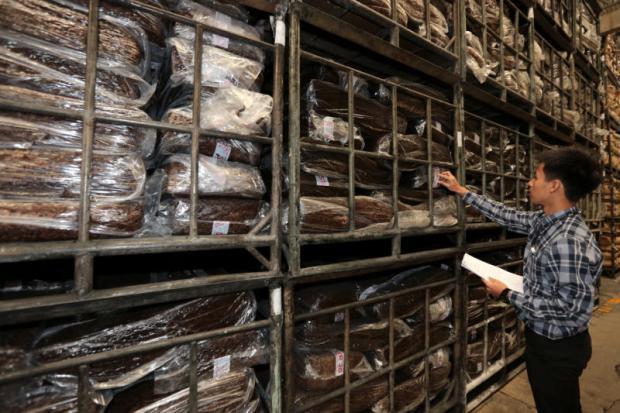Major tyremakers have threatened to stop buying rubber from Thai farmers because of low quality, senior industry officials say.
The warning has raised concerns about falling consumption that would lead to falling prices at a time when rubber prices remain in the doldrums.
Traders and industry officials said leading tyremakers, including Michelin and Bridgestone, have complained about the low quality of rubber, which mostly comes from the North and Northeast.
Senior executives from both Michelin and Bridgestone were not available for comment.

A man checks out scrap rubber to be used for making car tyres at a plant in Nakhon Pathom. Several tyremakers have criticised methods used in producing Thai rubber, which they say reduces its quality. CHANAT KATANYU
The director of Nongkhai Central Rubber Market, Anusorn Raemlee, told the Bangkok Post that some local rubber factories have declined to buy rubber from the farmers, saying that they put sulphuric acid in the latex during the tapping process, which dampens the quality of the rubber latex.
Farmers in the North and the Northeast normally put a drop of sulphuric acid in the rubber latex to make it coagulate more quickly before selling it as cup lumps to rubber factories.
The sulphuric acid, however, reduces the flexibility of the rubber, which causes problems on the processing lines for the major tyremakers, forcing them to change the substance mixing ratio. That, in turn, results in rising production costs.
“Flexibility is the prime characteristic that we need from natural rubber to produce good quality tyres,” said a trader at a leading rubber manufacturing company.
Veerasith Sincharoenkul, a director of Sri Trang Agro-Industry Plc, the country’s largest rubber producer and exporter, told the Bangkok Post that his company has experienced a slight drop in sales of clients from the US and the European Union.
“They started complaining about the weaker quality caused by [using] sulphuric acid. It could result in a slight [sales] drop of around 2-3% over the next few years. But, what concerns us is if other giant tyremakers, such as those in China, start to feel the same,” said Mr Veerasith. “What would happen to the Thai rubber industry then?”
China is the world’s biggest rubber importer, consuming around 70% of the 12 million tonnes produced annually worldwide. It imports around two million tonnes of Thai natural rubber per year.
That has raised concerns among rubber producers and farmers, who have seen their incomes drop with lower rubber prices over the past several years.
Traders said major problems dragging the price of natural rubber down include weak global oil prices, which encourage tyremakers to switch to synthetic rubber, a petrochemical product, and rising supply in major producing countries.
The price of unsmoked grade rubber sheet, which farmers sell to rubber factories, dropped to 49 baht per kilogramme yesterday, down from a record high of 180 baht per kilogramme in 2008.




























